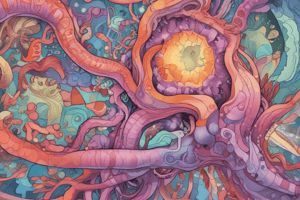Podcast
Questions and Answers
What is a common outcome of acute inflammation if the causative agent persists or recurs?
What is a common outcome of acute inflammation if the causative agent persists or recurs?
- Resolution of inflammation
- Tissue regeneration
- Immune system suppression
- Chronic inflammation (correct)
Which type of chronic inflammation is characterized by a specific microscopic feature, regardless of the cause?
Which type of chronic inflammation is characterized by a specific microscopic feature, regardless of the cause?
- Granuloma
- Acute inflammation
- Specific chronic inflammation
- Non-specific chronic inflammation (correct)
What is the term for a type of chronic specific inflammation characterized by a collection of epitheliod cells, lymphocytes, plasma cells, and giant cells?
What is the term for a type of chronic specific inflammation characterized by a collection of epitheliod cells, lymphocytes, plasma cells, and giant cells?
- Granuloma (correct)
- Abscess
- Pyelonephritis
- Fibrosis
What is the characteristic feature of Langhans giant cells?
What is the characteristic feature of Langhans giant cells?
What is the main difference between chronic and acute inflammation?
What is the main difference between chronic and acute inflammation?
What is the term for a type of giant cell that forms in response to a foreign body?
What is the term for a type of giant cell that forms in response to a foreign body?
What is the primary function of neutrophils in acute inflammation?
What is the primary function of neutrophils in acute inflammation?
Which type of granuloma is associated with unknown causes?
Which type of granuloma is associated with unknown causes?
What type of cells are involved in chronic inflammation?
What type of cells are involved in chronic inflammation?
What is the characteristic cell of allergic and parasitic inflammation?
What is the characteristic cell of allergic and parasitic inflammation?
What is the process by which giant cells are formed?
What is the process by which giant cells are formed?
What is the primary function of histiocytes in inflammation?
What is the primary function of histiocytes in inflammation?
Flashcards are hidden until you start studying
Study Notes
Chronic Inflammation
- Chronic inflammation occurs when the causative agent persists or recurs, or if the body's resistance is low.
- It can also start as a chronic condition from the beginning, e.g. Tuberculosis.
Characters of Chronic Inflammation
- Vasodilation
- Fluid exudate
- Tissue necrosis and Fibrosis
Types of Chronic Inflammation
Non-Specific Chronic Inflammation
- Usually follows acute inflammation, forming chronic abscesses and chronic pyelonephritis.
- Characterized by chronic inflammatory cells, fibrosis, and vascular thickening, regardless of the cause.
Specific Chronic Inflammation (Granuloma)
- Definition: A collection of epithelioid cells (specialized macrophages), lymphocytes, plasma cells, and giant cells.
- Types of granuloma:
- Infective granuloma (e.g. Bilharziasis, Tuberculosis, Histoplasmosis, Leprosy)
- Foreign body granuloma
- Unknown cause (e.g. Sarcoidosis)
- Giant cell types: Langhans giant cells, Foreign body giant cell
Cells Involved in Inflammation
Acute Inflammation
- Neutrophils (leukocytes)
- Histiocyte
- Monocyte
Chronic Inflammation
- B-lymphocyte
- T-lymphocyte
- B-lymphocytes forming plasma cells that produce immunoglobulins
- Eosinophils (seen in allergic and parasitic inflammation)
- Basophils (seen in allergic reactions)
- Mast cells
Functions of Cells
- Neutrophils: Phagocytosis of microorganisms in acute inflammation
- Eosinophils: Seen in allergic and parasitic inflammation
- Giant cells: Formed by fusions of histiocytes and monocytes or repeated nuclear division without cytoplasmic division.
Studying That Suits You
Use AI to generate personalized quizzes and flashcards to suit your learning preferences.





